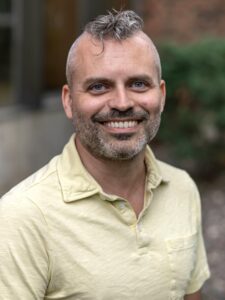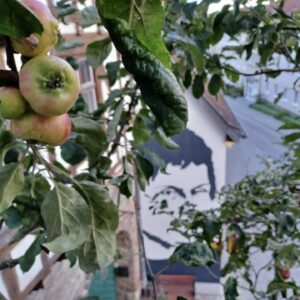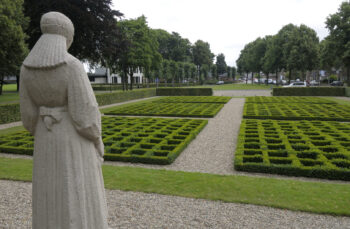 By Johan Baumeister
By Johan Baumeister
In front of an ancient, timbered house in Eisenach stands an apple tree. I’ve never seen it in person, but it can be viewed as it looked when Google last drove by in October 2020. Below the tree you’ll see a plaque. On that plaque is written a quote often attributed to Luther — though like the Lutherhaus folks, I feel compelled to acknowledge that it is found nowhere in his writings or those of his contemporaries. Translated, it reads, “Even if I knew the world were going to end tomorrow, I would still plant an apple tree today.”

The apple tree at Lutherhaus
Planting an apple tree is an act of hope and generally requires some level of commitment to care for it. Every year, you’ll need to consider and engage in pruning, applying compost, monitoring the health of the tree, watering the tree, thinning out the smaller fruits, and finally collecting the harvest. And for at least the first two or three years, you will need to do the work without expectation of the tree bearing any fruit.
“Even on my most difficult day, I feel better when I’m planting one of Luther’s metaphorical apple trees.”
The apple tree metaphor reminds me of my own journey through recovery. At some point along the way, someone told me that “Hope is where you point your heart, and commitment is when your feet are pointing in the same direction.” I think that’s akin to what Luther was advising; stay hopeful and keep following through on your commitments no matter how much you may despair.
For a person like me who lives in recovery from chemical and mental health challenges, it’s encouraging to know that even across the deep gulf of 500 years my own struggles aren’t completely alien to Luther or the people around him. “I’m not alone” is a helpful message contained therein. But also, “Our problems today are not so unique that they’re unrelatable across history.”
REGARDLESS OF WHETHER the quote is Luther’s or not — and I choose to believe that it is — Hessian pastor and Confessing Church leader Karl Lotz used it in 1944, while encouraging and reassuring his colleagues through difficult times. Lotz’s colleagues in the Confessing Church movement, which was founded 10 years prior, had failed to stop or even truly blunt Nazi brutality. They were not alone in that failure, nor were their attempts to succeed free of risk or cost.
The world was ending, in a sense, and it might well have felt like the Confessing Church had not done enough. Even as totalitarian thugs threatened doom for every even remotely “disloyal” word or act, Lotz was planting and watering seeds of hope and persistence in the minds of his colleagues.
“We each have our own challenges, unique to our own lives and circumstances.”
In the village of Putten, in the Netherlands, the month of October 1944 opened with a nighttime ambush by members of the Dutch resistance on a single car carrying two Wehrmacht officers and two corporals. One German lieutenant was mortally wounded. In retaliation for the Dutch resistance attack, the Germans raided the nearby village of Putten and took the entire male population aged 16 and older and deported them to concentration camps. More than 550 men and boys — 90% of the 16+ male population of Putten — perished. The world would indeed end for them in a very near tomorrow. But as the train departed, these men and boys of Putten did not rage. They did not curse their captors. Instead, they sang the verses of Psalm 84:
Blessed are those whose strength is in you,
whose hearts are set on pilgrimage.
They chose to reply to vengeance not with curses or despair, but by planting a sapling of hope in God’s blessings in their own hearts and in the hearts of those who would remember them. Their hope was in their Creator and the Creator’s Kingdom, and their actions imply that their commitment to that hope lasted to the end.

A monument to those fallen at Putten
WE EACH HAVE our own challenges, unique to our own lives and circumstances. Some of us have certainly faced death, and most have likely not. Few, if any, of us have faced the evils and adversity that Martin Luther, Karl Lotz, or the men and boys of Putten did. I do know this to be most certainly true: Even on my most difficult day, I feel better when I’m planting one of Luther’s metaphorical apple trees.
It is a certainty that difficult days lie ahead. It is also certain that you can find seeds of hope, plant and nourish them, and — perhaps years later — see some of them bear fruit. The Confessing Church movement that Karl Lotz was a part of and whose founding ultimately cost Dietrich Bonhoffer his life bore fruit from trees of hope planted by those men and others. From their Stuttgart Declaration, I echo their hope and prayer and invite you to do so as well:
We hope to God that through the common service of the churches, the spirit of violence and retribution — which wants to become powerful again today — will be controlled throughout the world and that the spirit of peace and love will come to rule, in which alone tortured humanity can find healing.
